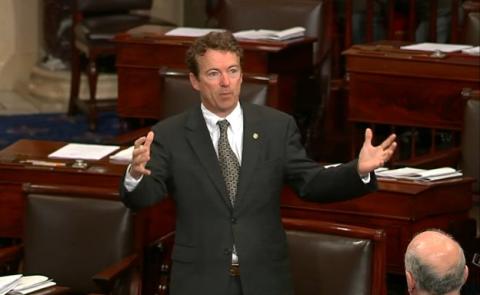Republican Senator from Kentucky, Rand Paul, introduced a Constitutional Amendment last week that would prohibit members of Congress from passing laws "applicable to a citizen of the United States that is not equally applicable to Congress."
http://www.youtube.com/watch?v=oP9SZ1FWR3k
S.J. Res 25, would also extend that requirement to the executive and judicial branches which includes the President, Vice President, Supreme Court Justices and others. As with all constitutional amendments, the chances of ratification remain low. However there are peripheral benefits to proposing a constitutional amendment. Most frequently, policymakers can leverage the proposed legislation to galvanize support around the issue and gain ground on similar issues.
Sen. Paul's amendment reads:
Section 1. Congress shall make no law applicable to a citizen of the United States that is not equally applicable to Congress.Section 2. Congress shall make no law applicable to a citizen of the United States that is not equally applicable to the executive branch of Government, including the President, Vice President, ambassadors, other public ministers and consuls, and all other officers of the United States, including those provided for under this Constitution and by law, and inferior officers to the President established by law.Section 3. Congress shall make no law applicable to a citizen of the United States that is not equally applicable to judges of the Supreme Court of the United States, including the Chief Justice, and judges of such inferior courts as Congress may from time to time ordain and establish.Section 4. Nothing in this article shall preempt any specific provision of this Constitution.'
Constitutional amendments need to be ratified by a two-thirds majority vote in both the House of Representatives and the Senate or by a constitutional convention called for by two-thirds of the State legislatures. That means 290 votes in the House and 67 votes in the Senate.
Although this is primarily part of Paul's effort to dislodge implementation of the Affordable Care Act, other congressional exemptions exist on things like insider trading, the Freedom of Information Act, and whistle blower protections.
Image credit: Paul.senate.gov
